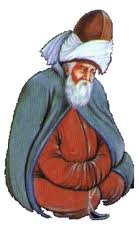 Mevlana was born in the city of Belh of the Horasan country which falls within the boundaries of current Afghanistan, on September 30, 1207.
Mevlana was born in the city of Belh of the Horasan country which falls within the boundaries of current Afghanistan, on September 30, 1207.
Mevlana’s father was Bahaeddin Veled, the son of Hüseyin Hatibi, who, besides being one of the notables of city, was also known in his life time as the”Sultan of the Scholars”. His mother was Mümine Hatun, the daughter of Rükneddin, who was the Emir of Behl. Sultanü’l – Ulema Bahaeddin Veled, because of certain political incidents and the approaching Mongolian invasion could no longer stay in the city. Thus, in the year 1212 or 1213 Sultanü’l – Ulema left Behl with the members of his family and close friends.
His first stop was Nişabur where he met the well known Sufi Feridüddin Attar. There, despite his young age Mevlana was noticed by Feridüddin Attar who showed his appreciation and approval of the young man.
Sultanü’l – Ulema moved from Nişabur to Baghdat and later took off for Kaaba through Küfe. On his way back from the priglimage he stopped at Damascus and from Damascus he reached Larende (Karaman) passing through Malatya, Erzincan, Sivas, Kayseri and Niğde. They settled in the theological school (medrese) built by Subaşı Emir Musa.
Sultanü’l – Ulema and his family who arrived at Karaman in 1222, stayed there for 7 years. There, Mevlana married Gevher Hatun who was the daughter of Şerefeddin Lala. The marriage gave Mevlana two sons named Sultan Veled and Alaeddin Çelebi. Years later, with Gevher Hatun dead, Mevlana married for a second time with Kerra Hatun, who was a widow with a child. Second marriage also gave him two sons, Muzaferreddin and Emir Alim Çelebi, and a daughter called Melike Hatun.
During those years the greater part of Anatolia was under the reign of the Seljuk State and Konya was the capital. Hence Konya was bestowed with works of art and artists, and scholars were abundant in the city. In short, Seljuk State headed by Alaeddin Keykubad, was enjoying its most spectacular days. Alaeddin Keykubad invited Sultanü’l – Ulema Bahaeddin Veled from Karaman and asked him to settle in Konya.
Bahaeddin Veled accepted the invitation of the Sultan and arrived in Konya on May 3, 1228 with his family and friends. Sultan Alaeddin met them with great ceremony and allocated the Altunapa (İplikçi) Medrese (theological school) to their use.
Sultanü’l – Ulema died in Konya on January 12, 1231. The rose garden of the Seljuk palace was chosen for his grave and he was buried at the same spot the grave stands today at the Mevlevi lodge which is now used as a museum. When Sultanü’l – Ulema passed away, his students and followers gathered around Mevlana, regarding him as the sole heir of his father. In fact Mevlana had become a great scientific and religous scholar and was sermoning at the İplikçi Medrese. His sermons were drawing large crowds.
Mevlana met Şems-i Tebrizi on November 15, 1244. Mevlana found in his character “the existance of absolute maturity” and saw in his face “the spiritual lights of God”. However their companionship did not las long as Şems suddenly died. After this death, Mevlana went into long years of seclusion. In later years, Selahaddin Zerkubi and Hüsameddin Çelebi tried to compansate the loss of Şems-i Tebrizi
Mevlana, who summarized his life with the words, “I was raw, cooked and then burned” died on Sunday, December 17,1273. He had willed his burial prayers to be led by Sadrettin Konevi. However, Sadrettin Konevi was completely shattered with the death of Mevlana whom he loved greatly, and fainted at the ceremony. The prayer was then led by Kadı Sıraceddin.
Mevlana believed the day of death to be a day of rebirth. Death would take him to his beloved; that is, the God. With this believe he was referring to the day of death as “Şeb-i Arus” which means wedding day or the bridal night and willed his friends not to cry and wail after him.
“When we are dead, do not turn your eyes to the ground, seeking my grave! My grave will be in the hearts of the wise” Hz. Mevlana
Popularity: 8% [?]

